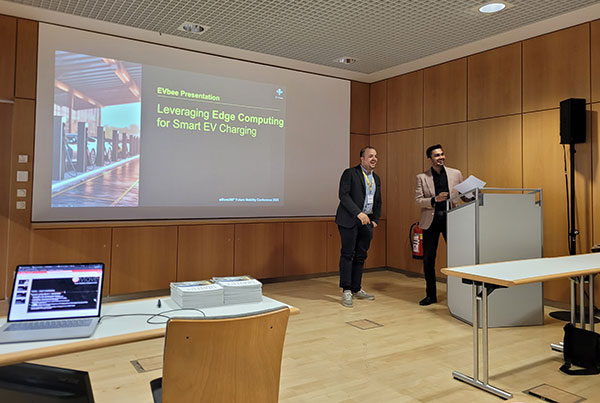This speech will emphasize Edge Computing and how we can utilize functions to improve smart charging. With a focus on ensuring that smart charging is safe, reliable, and ready for future developments, this is an important discussion for the e-mobility industry. eMove360°, which will take place in Munich this year, is a notable date for those in the EV industry as it is one of the world's leading trade fairs for electric mobility. Now in its seventh year and with over 200 exhibitors, the conference promises to provide an inspiring few days of networking, learning, and sharing ideas with fellow industry professionals worldwide.

The Rise of Smart Charging Technology
At EVbee, smart charging is a central aspect of all our charging solutions. Early in our development, we recognized the huge impact that smart charging would have in the industry going into the future. At the beginning of 2023, the UK joined other countries leading the e-mobility transition and created an EV Smart Charging Action Plan. By 2025, EV smart charging is to 'become the norm.' In the following section, we will discuss smart charging to demonstrate why EVbee has been committed to EV technology and why it features so strongly in our designs.
By 2030, it is predicted that electric vehicles (EVs) will account for more than 60% of all cars sold worldwide. This growth has been labeled "explosive" and is an encouraging sign in the progression towards the goals of Carbon Net Zero. Yet the millions of EVs that make up this percentage create the need for a substantial transformation to the current transportation industry. An important part is ensuring that the infrastructure supporting EV charging can keep up with demand. Whilst EVs take away the need for reliance on finite reserves of fossil fuels like conventional petrol or diesel-fuelled cars, this surge in EVs will substantially increase demands on national electricity systems. To ensure that the development of EVs continues to benefit low-carbon goals, we must evaluate the electricity networks so that they can operate efficiently and in the most sustainable ways possible. This is where smart charging is important in developing a sustainable, reliable, and safe EV industry.

What is smart charging technology?
Before continuing, let's address what smart charging technology means. Smart charging allows charging operators, whether individuals or businesses with multiple charging stations, to optimize charging by having full control over energy distribution during EV charging. Operators can tailor the charging experience to individual needs by deciding how long to charge, when, and how much energy is used. In turn, this produces a number of benefits for both at-home EV charging and larger-scale public charging operations.
Smart charging benefits include:
- Cost-effectiveness
- Increased Convenience
- Improved Efficiency
- Grid Stability
For the adoption of smart charging to be fully rolled out across countries like the UK, a recent government report has highlighted some core potential obstacles that must be addressed. Firstly, households that do not have off-street parking, such as those living in flats or rental properties, are currently limited in their access to smart charging. There are also risks involved in integrating a nationwide energy system, such as cyber security and grid stability, that need to be addressed. Check out the paragraph on our presentation at eMove360° discussed below for our take on this. An interesting finding of the report also highlighted the lack of general public knowledge about smart charging and the important ways that it can help their daily life and maximize EV usage.
Edge Computing in Smart Charging
At Fred's talk in Munich for eMove360°, he will represent EVbee and discuss his valuable insights into smart charging that he has collated during his career. Fred will outline the importance of ensuring stability, reliability, and security when considering the future of EV charging. As an important part of ensuring this, focus will be paid to Edge Computing. As a fairly recent advancement in the industry, Edge Computing moves away from centralized cloud networks and enables data to be stored and processed on local devices. Utilizing Edge Computing can ensure seamless home charging experiences and large-scale adoption of EVs network-wide. As data is localized, this offers improved security, quicker performance, and lower costs. With the high demand for a quicker and more efficient way to transition to EVs becoming increasingly important, this latest advancement will inevitably become a core element of EV charging.
If you would like to hear more about our take on the future of EV charging, join us for Fred's talk at eMove360° Future Mobility Conference 2023 on October 19th at 10:20 am. If you cannot attend in person, we will also be sharing more information about this on our social media before and after the conference.

